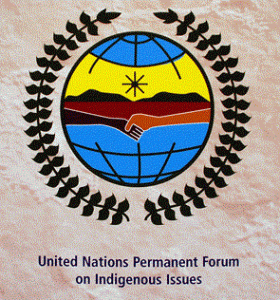 Indigenous peoples are not currently included in the United Nations structure in a manner consistent with their right to self-determination, and the reality of their representative institutions, which are also governing bodies. As a result, indigenous voices are often absent from discussion on topics that highly impact indigenous communities, even though the United Nations Declaration on the Rights of Indigenous Peoples (UN Declaration) requires their involvement in decision-making that would affect their rights. In 2014, as part of the High Level Plenary to be known as the World Conference on Indigenous Peoples (World Conference), the United Nations (UN), under pressure from the global indigenous community, committed to explore and identify ways to correct this injustice. NARF and its client, the National Congress of American Indians (NCAI), have actively engaged in this conversation to ensure that the interests of indigenous peoples are fairly represented.
Indigenous peoples are not currently included in the United Nations structure in a manner consistent with their right to self-determination, and the reality of their representative institutions, which are also governing bodies. As a result, indigenous voices are often absent from discussion on topics that highly impact indigenous communities, even though the United Nations Declaration on the Rights of Indigenous Peoples (UN Declaration) requires their involvement in decision-making that would affect their rights. In 2014, as part of the High Level Plenary to be known as the World Conference on Indigenous Peoples (World Conference), the United Nations (UN), under pressure from the global indigenous community, committed to explore and identify ways to correct this injustice. NARF and its client, the National Congress of American Indians (NCAI), have actively engaged in this conversation to ensure that the interests of indigenous peoples are fairly represented.
This week and last in New York, indigenous peoples from around the world gathered for the 16th Session of the United Nations Permanent Forum on Indigenous Issues (UNPFII). Established in 2000, the UNPFII is an advisory group that provides recommendations on indigenous issues to various bodies of the United Nations. At this year’s meeting, the group is noting the upcoming ten-year anniversary of the United Nations Declaration and, as part of the process set in motion by the Outcome Document of the World Conference, is examining fundamental questions related to indigenous peoples’ participation in the United Nations. Indigenous peoples often have been required to participate in the United Nations as non-governmental organizations, which is unacceptable to indigenous peoples’ governments and representative institutions. There are many other questions under discussion. How can the United Nations structure adapt to accommodate indigenous peoples? What qualifies a community as an indigenous people and who makes those decisions? How can indigenous peoples’ voices be most effectively heard?
At the UNPFII meetings and beyond, NARF advocates in the international arena on issues impacting the rights of indigenous peoples. We actively work to counter the damage done by colonization and to affirm the rights of indigenous peoples as enshrined in the UN Declaration, the American Declaration on the Rights of Indigenous Peoples, and other human rights instruments. We seek to protect and promote the rights of indigenous peoples to develop and preserve their own cultural, social, political, and legal systems. You can support our work with a donation to NARF today.
If you would like to learn more about NARF’s work on the ongoing process of establishing an appropriate and dignified status for indigenous peoples’ participation within United Nations bodies, please visit the related case update.
More blog posts

